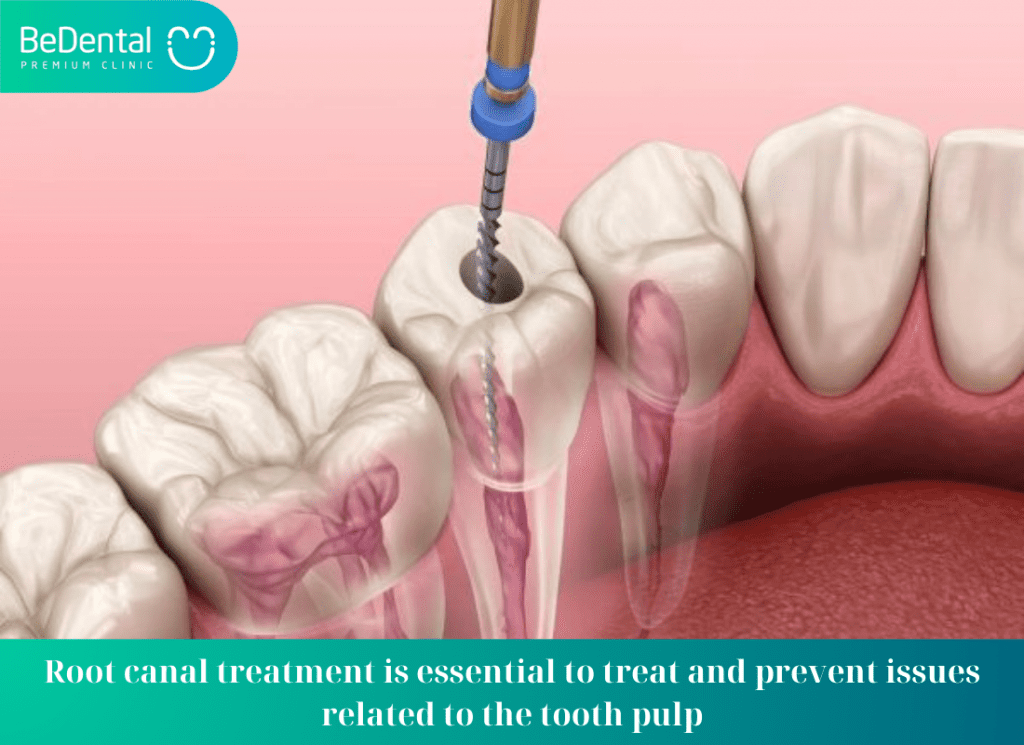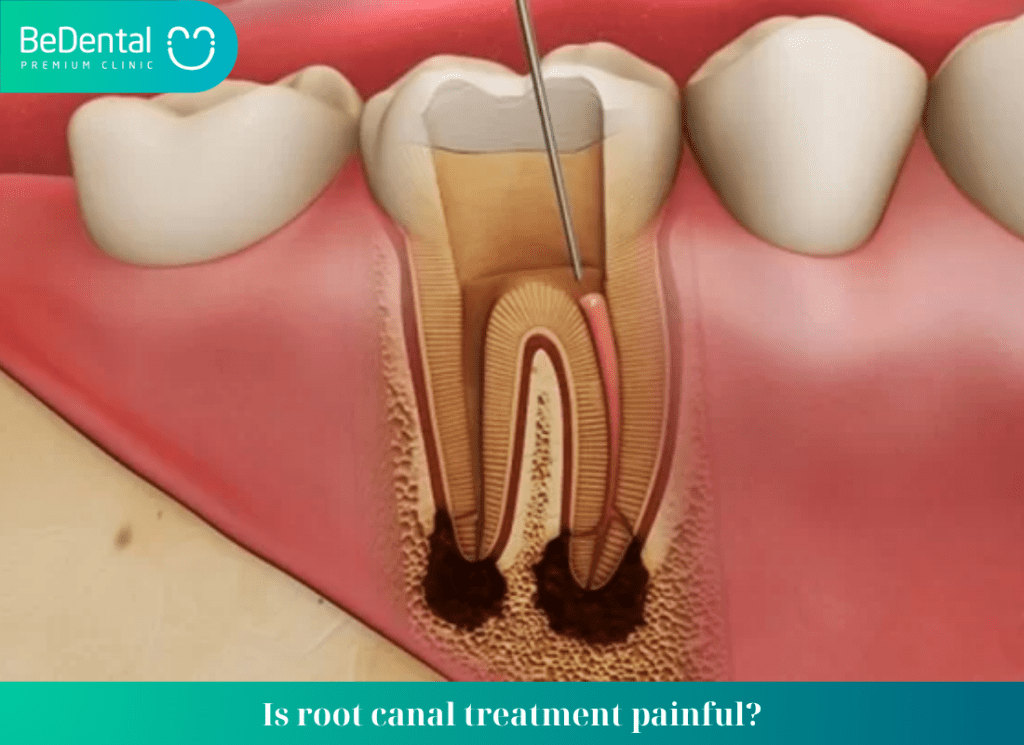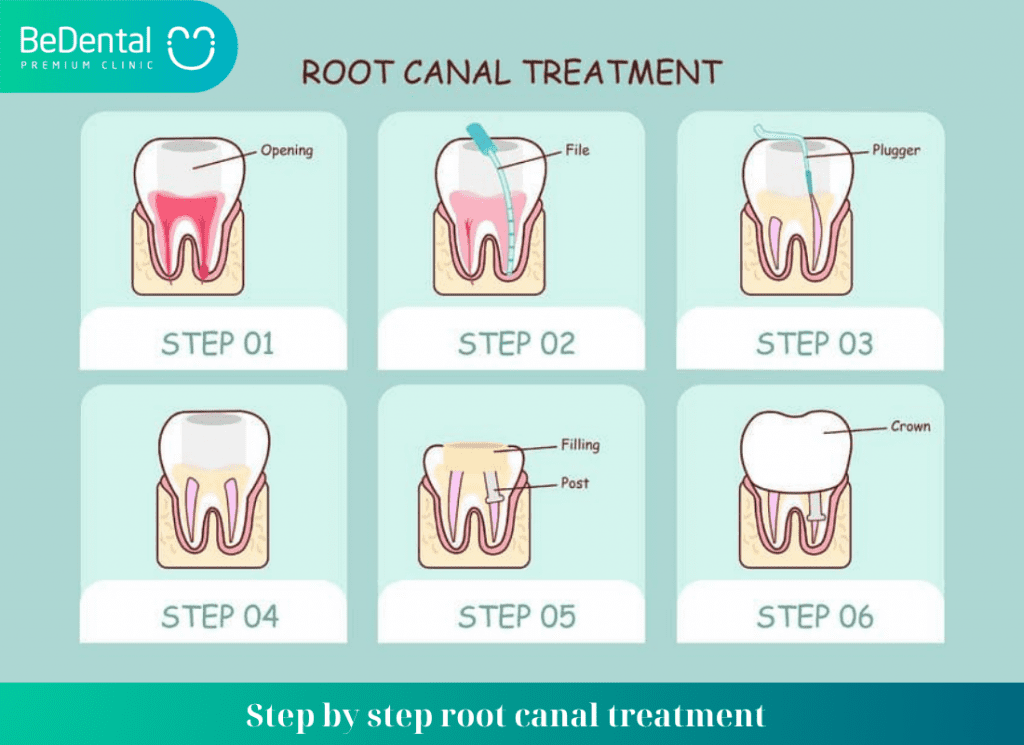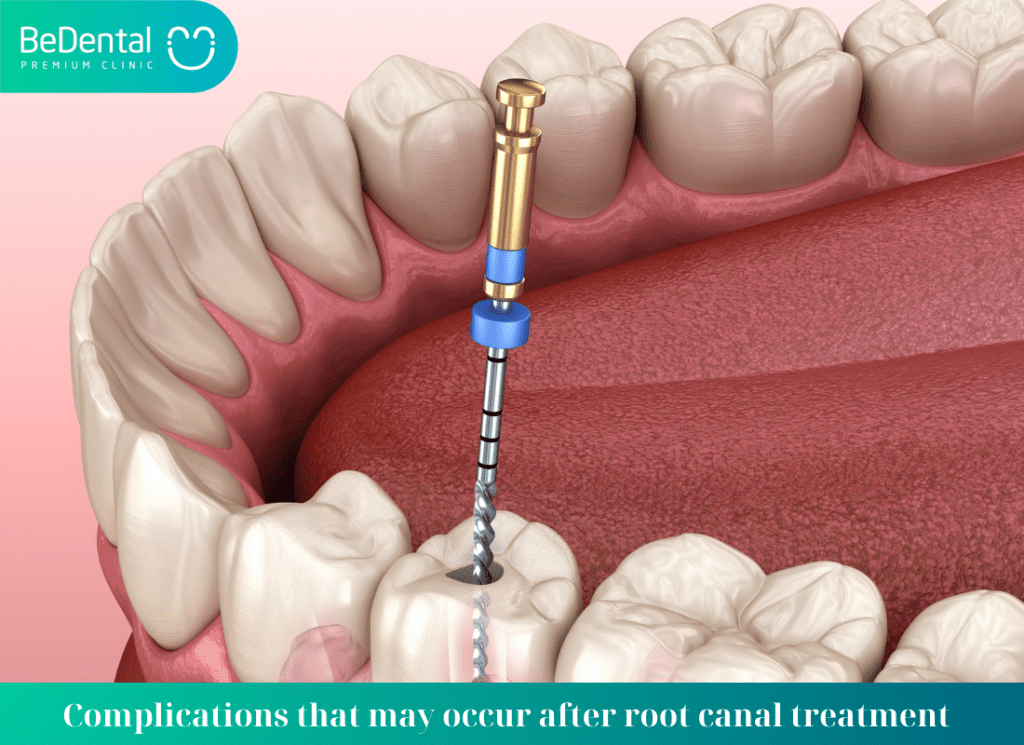The process of root canal treatment – Root canal treatment or root canal therapy is the optimal method to treat pulp-related diseases, helping you to get rid of toothache discomfort and preserve the natural structure of the tooth while avoiding the need for extraction. However, in some cases during and after treatment, there may be pain that causes patients to worry and try to avoid undergoing the procedure. Understanding the procedures and processes of root canal treatment will help you overcome anxiety and fear when undergoing this treatment.
Why is root canal treatment necessary?
Root canal treatment is essential to treat and prevent issues related to the tooth pulp. Below are some reasons why root canal treatment is necessary:
- Pulpitis: Pulpitis is a condition when the tooth pulp becomes inflamed, mainly due to bacterial infection. Bacteria can enter the tooth pulp through a hole or crack, causing pain and inflammation. Root canal treatment helps eliminate bacteria and reduce inflammation.
- Tooth pulp infection: When bacteria penetrate the tooth pulp and spread, a tooth pulp infection occurs. This is a severe condition that can cause pain, swelling, and potentially lead to widespread inflammation damaging the structures around the tooth. Root canal treatment is performed to eradicate bacteria and prevent infection.
See more: What is teeth tightening during braces?

- Swelling and pain: When the tooth pulp is inflamed or infected, the patient will feel pain and swelling in the affected tooth area. Root canal treatment helps reduce pain, swelling, and restore function and comfort to the tooth.
- Preserving natural teeth: Root canal treatment helps preserve natural teeth. Instead of extracting or removing the tooth, root canal treatment helps preserve and restore the shape and structure of the tooth. This is particularly important because natural teeth play a vital role in food digestion, communication, and overall aesthetics.
- Preventing the spread of infection: When the tooth pulp is infected, bacteria can spread to the surrounding structures such as ligaments, bone, and blood vessels. Root canal treatment helps prevent the spread of infection and keeps the oral area clean.
- Facilitating further treatment procedures: In some cases, root canal treatment is part of a larger dental treatment process, such as tooth extraction, crowns, or fillings. Root canal treatment is necessary to restore the tooth and prepare for other treatment procedures.
Overall, root canal treatment is essential to treat inflammation, infection, and pulp-related issues to maintain the shape of natural teeth and ensure function and comfort in the oral cavity.
Is root canal treatment painful?
Is root canal treatment painful? During root canal treatment, each person will experience a certain level of pain. However, the level of pain depends on each specific case because pain tolerance varies from person to person. Here is some information related to pain during root canal treatment:
- General anesthesia: Before performing root canal treatment, the dentist will use anesthesia to numb or reduce pain in the oral area. This helps reduce pain and swelling during treatment.
- Pain level: The level of pain during root canal treatment will vary depending on the type of tooth pulp, the degree of inflammation, and individual sensitivity. Some people may experience mild or moderate pain, while others may feel more frequent pain. Pain usually persists during treatment and gradually decreases afterward.
- Discomfort: In addition to pain, some people may feel uncomfortable during root canal treatment. This may include difficulty breathing, toothache, or discomfort when the dentist speaks in the mouth.

- Monitoring: The dentist will provide you with pain control measures during the root canal treatment process. This may include using pain medication after the treatment or giving recommendations for home pain management methods.
Most importantly, if you experience severe or prolonged pain after the root canal treatment, you should contact your dentist immediately. This could be a sign of a serious issue that needs to be diagnosed and treated.
Note that root canal treatment should be performed by a professional dentist to ensure safety and minimize pain. The dentist will use methods to reduce pain and ensure that you feel comfortable during the treatment process.
The process of root canal treatment
Root canal treatment (also known as endodontic therapy) is performed by a dentist to address issues related to inflamed, infected, or damaged tooth pulp. Here is the standard root canal treatment process:
- Diagnosis and clinical evaluation: The dentist will examine your oral cavity, listen to symptoms, and ask you to share more about any pain or discomfort. If necessary, they may perform an ultrasound or CT scan to assess the condition of the tooth pulp in detail and determine whether the tooth needs root canal treatment.
- Pulp removal: During the root canal treatment process, the dentist will use a small needle to inject anesthetic into the tooth pulp and surrounding tissue. This numbs the area around the tooth and reduces pain and discomfort during the treatment.
- Accessing the pulp: The dentist will use dental tools to create a small hole in the tooth to access the pulp. By using these tools, the dentist will remove damaged, inflamed, or infected pulp.
- Cleaning and disinfection: After accessing the pulp, the dentist will clean the pulp area with small instruments and disinfectant solutions. Disinfection helps remove plaque and bacteria from the pulp, preventing inflammation, infection, and further spread of bacteria

- Filling treatment: After cleaning and disinfecting, the dentist will fill the root canal with a filling material to restore the function and structure of the tooth. The filling material is typically a substance like gutta-percha, used to fill the space inside the root canal after the pulp has been removed.
- Sealing the tooth: After the root canal is treated and filled with the filling material, the dentist will proceed to seal the tooth to restore its shape and preserve the tooth. Tooth sealing is usually done using appropriate sealing materials like composite or amalgam.
Follow-up and monitoring after treatment: After the root canal treatment process, the dentist will perform a dental check-up to confirm that the tooth and root canal have been treated properly and there are no issues. They may also provide instructions for post-treatment recovery and additional measures including pain medication if needed.
Complications that may occur after root canal treatment
Although root canal treatment is a common and safe procedure, some complications may occur in some cases. Here are some potential complications after root canal treatment:
- Pain and sensitivity after treatment: Some people may experience pain and sensitivity after a root canal treatment. This is temporary and will gradually decrease after a few days. You should use pain medication as prescribed by the dentist to alleviate the pain.
- Infection: A potential complication after root canal treatment is infection. If bacteria persist after the treatment, it can cause an infection in the area around the root canal. To prevent infection, you should follow oral care instructions after root canal treatment and inform the dentist of any infections.
- Nerve pain: Some people may experience nerve pain after root canal treatment. Tooth pain may occur when the nerve in the tooth is affected by the treatment. The tooth pain is mild and will decrease over time.

- Cracked tooth: In some cases, a tooth may crack after a root canal treatment. This can occur due to the current condition of the tooth or physical factors during the treatment. If a tooth cracks, you should contact the dentist immediately to address the issue.
- Infection: In some cases, the root canal may become infected after treatment. If bacteria or infection is not completely eliminated during the treatment, they may reoccur and create new issues. You should follow oral care instructions after root canal treatment and regularly visit the dentist to help stabilize your oral health.
See more: Tips for eliminating bad breath
Most importantly, to minimize complications after root canal treatment, you should seek advice and treatment from a professional dentist and strictly adhere to oral care routines after treatment.
Post-root canal treatment care
After a root canal treatment, proper oral care is essential to promote recovery and prevent complications. Here are some tips on post-root canal treatment care:
- Follow the dentist’s instructions: Adhering to the guidance and directions of the dentist is crucial. They can provide detailed instructions for post-root canal treatment care based on your specific needs. Make sure you know how to follow these instructions.
- Oral health care: Proper oral care is key to maintaining oral health. Make sure to brush your teeth at least twice a day using a soft toothbrush and fluoride toothpaste. Ensure you clean every surface of your teeth and do not forget to brush around the roots that have been treated.

- Use antibacterial mouthwash: Using antibacterial mouthwash after root canal treatment can help eliminate bacteria and keep your mouth clean. Use antibacterial mouthwash as directed by the dentist or product label
- Avoid dark-colored foods and drinks: In the initial period after root canal treatment, teeth may be sensitive and prone to staining. Limit exposure to dark-colored foods and drinks such as coffee, red wine, carbonated drinks, and tea to prevent tooth discoloration.
- Avoid hot or cold foods and drinks: Avoid contact with foods and drinks that are too hot or too cold in the short period after root canal treatment. Teeth may be sensitive and easily irritated.
- Adjust your diet: Avoid consuming alcohol, sugary foods, and hot or cold foods shortly after root canal treatment. This helps prevent damage to the treated teeth.
- Preventive treatment (if necessary): Your dentist may recommend using pain medication or antibiotics after root canal treatment. Follow the instructions for use and contact your dentist if you have any issues or concerns after the treatment.
See more: Does smoking pods cause yellow teeth?
Note that post-root canal treatment care advice may vary depending on your health condition and your dentist’s instructions. Discuss and follow your dentist’s guidance to ensure a successful recovery process.
With a team of experienced professionals, advanced equipment, and modern technology, Bedental Cosmetic Dentistry has taken solid steps to become a leading cosmetic dentistry center in Vietnam. Bedental has explained the doubts about root canal treatment through the article. Visit Bedental to experience the best root canal treatment.
Tư vấn chuyên môn bài viết:
BÁC SĨ DƯƠNG THỊ THÙY NGA





